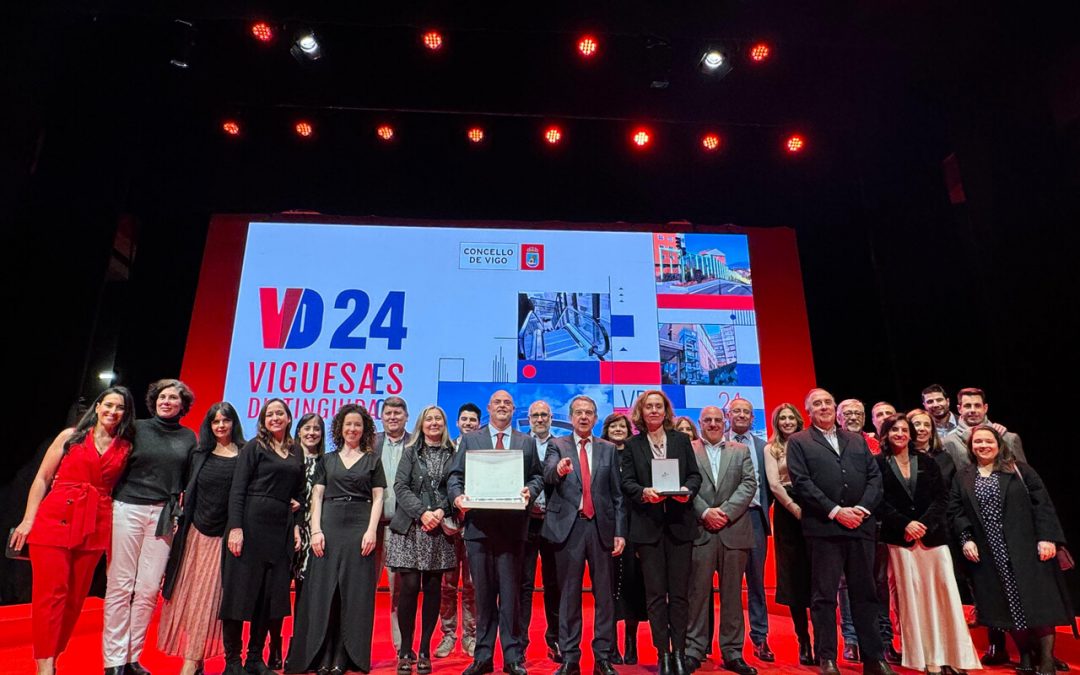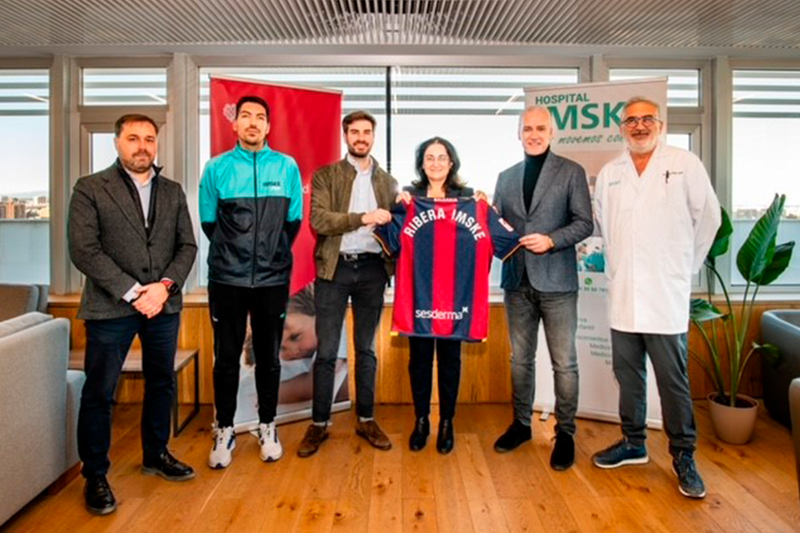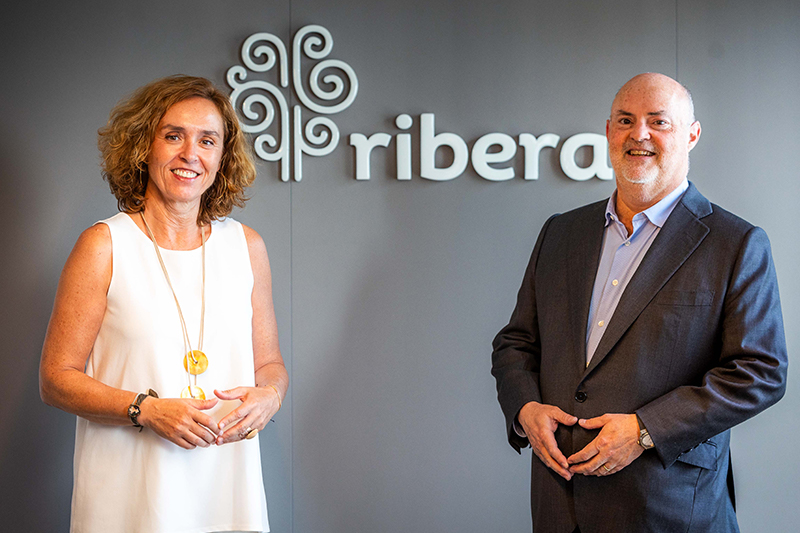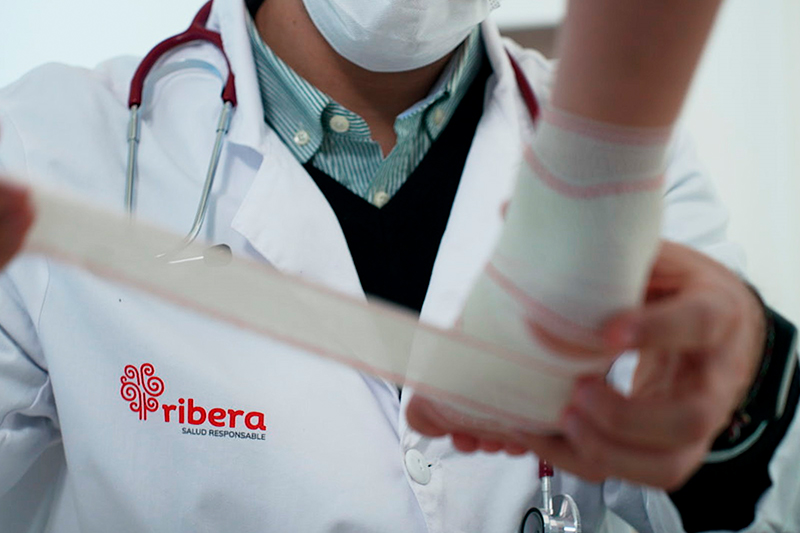
by S0p0rt3 | Jun 4, 2024 | Ribera |
- The president of the Ribera Group, Alberto de Rosa, receives this prestigious distinction at the Distinguished Vigoians gala and thanks all the professionals for their professionalism, passion and dedication “in this great health and social project, which was born by and for the citizens of Vigo”.
- The mayor of Vigo, Abel Caballero, pointed out that the Ribera Povisa hospital was distinguished for protecting and preserving people’s health, for the 1,300 workers who work there and for more than 50 years looking after our health”.
The Ribera Povisa Hospital received yesterday the Gold Medal of the city of Vigo, at the Gala of Distinguished Vigueans, in recognition of its contribution to the quality of health care in the area throughout its 50 years of history. The event was held at the Afundación Theatre in the afternoon, which welcomed representatives of Vigo society and Galician institutions, as well as professionals from the hospital itself and the Ribera Group.
The president of the Ribera health group, Alberto de Rosa, received the award from the mayor of Vigo, Abel Caballero, and thanked the mayor for this special recognition “on behalf of all the professionals who are and have been part of Povisa”. “I am very proud and excited to represent this great health and social project, which was born by and for the citizens of Vigo,” he said. “We citizens believe that a hospital is the place where we receive healthcare when we are ill. But Ribera Povisa is much more. Because they look after your health, but they also look after you, your wellbeing. Just as families do. Because Ribera Povisa is a family. They have formed a great family of which all the people of Vigo feel part and proud”, he added. De Rosa also stressed that Povisa has always been “a pioneer in a unique model of collaboration between civil society and the administrations, so that the residents of Vigo have access to the best possible health care”. “Povisa was born to complement the city’s healthcare, in a structural way, leading a unique project,” he explained.
For his part, the mayor of Vigo, Abel Caballero, pointed out that the Ribera Povisa hospital was distinguished “for protecting and preserving the health of the people who come to the hospital every day, for the 1,300 workers who develop their professional careers there and for more than 50 years looking after our health”.
The City Council of Vigo announced the award of the Gold Medal to the Ribera Povisa hospital last December, during the institutional act in which the health centre celebrated its 50th anniversary. “Ribera Povisa is an essential hospital for this city and we want to pay tribute to it as a health institution that is committed to excellence and quality,” said Mayor Abel Caballero on that occasion. “Povisa plays a fundamental role in the health and employment of Vigo and provides great health care to thousands of Vigueans.
The Gold Medal is the highest award given by the City Council of Vigo to individuals, groups or entities for their merits in the service of the city and its metropolitan area in any aspect of social, cultural, sporting or economic reality. The distinction has its origins in 1936 and was awarded occasionally until 1987, when it began to be awarded annually, in the days prior to 28 March, the day of the local feast of the Reconquest. Among the institutions recognised over the years are the University of Vigo, the Real Club Celta de Vigo, the AECC and the automobile industry, among many other illustrious personalities. This year, Ribera Povisa receives the award together with the National Police, which celebrates its 200th anniversary.
The Ribera Group’s CEO, Elisa Tarazona, the managing director of the Ribera Povisa hospital, Ángela Guerra, and the care director, Sonsoles Leal, as well as Javier Atanes, managing director of the other two centres that the Ribera Group has in Galicia (the Ribera Juan Cardona hospital, in Ferrol, and the Ribera Polusa hospital, in Lugo), among other Ribera Group professionals, attended the gala of distinguished Vigo residents.

by S0p0rt3 | Feb 19, 2024 | Ribera |
- The new Ribera-Povisa Chair in Innovation and Health will create an academicprofessional development programme that will help the School’s teachers to obtain a doctoral degree through their incorporation into UVigo’s doctoral programmes.
- In the case of the secondment agreement, it is a renewal of the existing one, signed in June 1991, due to the change of ownership of Povisa once it was acquired by the Ribera Salud Group, and its adaptation to the new laws.
The University of Vigo and the Ribera health group have just signed two collaboration agreements to renew and promote the already close collaboration between the two entities. These are the renewal of the agreement for the affiliation of the Ribera-Povisa University School of Nursing to the University and the creation of a Chair in Innovation and Health.
The agreements will be presented institutionally in the near future, but both entities anticipate that it is a “strategic” collaboration that will allow the implementation of multiple joint initiatives, both in the field of teaching and research.
In the case of the secondment agreement, it is a renewal of the existing one, signed in June 1991, due to the change of ownership of Povisa once it was acquired by the Ribera Salud Group, and its adaptation to the new laws. In this line, the vice-rector of Degrees and Teaching Innovation, Alfonso Lago, emphasises that the renewed document establishes the access procedure for the staff of the University School of Nursing Ribera-Povisa to the different training programmes that are taught at the University of Vigo, “among them, the courses for new lecturers, compulsory for the new figures of assistant lecturer doctor”. It also includes support and collaboration for the development of the research activity of the school’s teaching staff, “which will allow the integration of these teachers in UVigo’s research groups and in collaborative research projects between both entities in accordance with current legislation”, emphasises the vice-rector.
“The work of the CPR de FP Povisa and EU de Enfermería Ribera-Povisa, our study centre in Vigo, has enabled us to offer top quality training since 1991, both to nursing professionals and to senior technicians, and it shows us the path to follow in the future. At the Ribera Group, we are firmly committed to teaching and training.
This agreement opens up new academic and employment opportunities for our professionals. As an added value, we are creating new synergies with the University of Vigo, a basic pillar in the progress of society’s well-being,” explains Elisa Tarazona, CEO of the Ribera Group.
Joint research and innovation projects
The new Ribera-Povisa Chair in Innovation and Health will bring with it the creation of an academic-professional development programme which, among other things, will help the School’s teaching staff to obtain doctoral degrees through their incorporation into UVigo’s doctoral programmes. At the same time, it will also seek to develop programmes and activities aimed at promoting knowledge and the use of new techniques and tools to provide students and professionals of the Ribera-Povisa University School of Nursing with cuttingedge resources.
In addition, the Ribera-Povisa Chair is also expected to host possible innovation projects and lines of research in the healthcare field related to the different doctoral programmes.
“Precisely, one of the main objectives of the chair is that in the future nursing teachers will obtain the title of doctor and, therefore, be able to participate in all the University’s research activities, join existing groups or create new ones, benefit from research, mobility and doctoral grants, etc.”, explains the vice-rector for Research, Transfer and Innovation, Belén Rubio, who adds that this chair will initiate some project actions, mobility, etc. to achieve this objective “as soon as possible”.
“In healthcare, continuous training and research are essential, and with the Ribera-Povisa chair, study opportunities increase, and the potential to advance and improve healthcare is expanded,” concludes Elisa Tarazona.

by S0p0rt3 | Feb 19, 2024 | Ribera |
- The general manager of Ribera IMSKE, Isabel Muñoz, and the president of Levante UD, Pablo Sánchez, have signed the collaboration agreement by which the medical centre of reference in sports medicine also becomes a sponsor of the club for this season, with the possibility of renewal.
After the announcement last December 27th that Ribera IMSKE was taking over the medical services of Levante UD under the direction of Joel Gambín, now the hospital of the Ribera health group also supports Levante UD to unite both brands in each and every one of the sporting and social activities carried out by the club. Both institutions will also work together on programmes that combine sport and health, training days, workshops, as well as actions with the Levante UD squad players.
The general manager of Ribera IMSKE, Isabel Muñoz, and the president of Levante UD, Pablo Sánchez, have signed the collaboration agreement by which the medical centre of reference in sports medicine also becomes a sponsor of the club for this season, with the possibility of renewal.
Isabel Muñoz pointed out that “we are proud that a Club such as Levante UD has trusted our centre and our professionals to provide medical supervision for its staff, and we are very excited to be able to extend our collaboration to carry out new joint actions that unite two disciplines with so many synergies such as sport and health, to contribute to promoting healthy lifestyles in our population”.
“We were very happy with the incorporation of Ribera IMSKE to the Levante UD medical team because it is the latest vanguard in sports medicine and our main assets are in the best hands, but now, in addition, having their support as a brand to develop multiple joint actions is even better. When a supplier becomes a travelling companion as a collaborator, then we share values that in the end are what will take us further,” said Pablo Sánchez, president of Levante, who thanked Isabel Muñoz, Ignacio Muñoz, medical director of IMSKE, Joel Gambín, medical director of Levante UD and Carlos Cabreres, coordinator of Physiotherapy, for the work they are doing with Levante UD athletes and which they are developing side by side with the professionals who were already part of the club’s medical structure.
About IMSKE
IMSKE is a pioneering hospital in Spain, specifically focused on the prevention, diagnosis and comprehensive treatment of the entire locomotor system. Founded in 2020 by doctors Isabel and Ignacio Muñoz Criado, IMSKE is a hospital centre designed by doctors and oriented towards the patient, based on a deep knowledge of musculoskeletal pathologies. It currently has more than 100 professionals from different areas, who work in permanent collaboration to attend to the patient throughout the entire medical recovery process.
But it also has among its values, research and teaching. The ongoing training of its entire team, as well as of new professionals, both national and foreign, is one of the missions that led its founders to set up this project and call it the European Musculoskeletal Institute.
IMSKE currently has one of the best care ratings both in direct patient reviews and in the satisfaction indicators of the main insurance companies.
Thanks to this extraordinary rating, the hospital has consolidated its position in Valencia in just three years, laying the foundations for an innovative, efficient and disruptive
project in the field of medicine.
About Ribera
Ribera is a business group that provides public and private healthcare services and has been working for the health and well-being of the population since 1997. In Spain, it is present in 5 autonomous communities, manages 13 hospitals, 2 of which are university hospitals, and 70 health centres and polyclinics, as well as other projects in Europe and Latin America. For more than 20 years it has developed a public-private partnership model that is being studied as a success story at leading universities such as Berkeley and Harvard Business School. The group also has a University School of Nursing and a Health Professional Training Study Centre, a Futurs technology division, a Ribera Lab laboratory division, a Ribera b2b purchasing centre and a Foundation for research and health promotion, among other projects. Its responsible health model based on value-based medicine responds to its commitment to society to continue providing value and innovative solutions to address global health challenges, in line with the Sustainable Development Goals of the 2030 Agenda.

by S0p0rt3 | Feb 19, 2024 | Ribera |
- The healthcare group has invested more than 25 million euros in the renovation and purchase of new technology and infrastructures and signs a strategic agreement with Microsoft, implements new digital nutrition and telerehabilitation programmes.
- Both the three hospitals in Galicia and the three in Murcia are expanding their portfolio of health services for the population and Ribera Lab, its laboratory division, is taking on the integral biological diagnosis of the Vinalopó (Elche) and Torrejón (Madrid) areas.
Ribera continues to grow in the number of healthcare centres, services, technology and infrastructures for the healthcare of citizens. In 2023, the healthcare group has added the Cascais Hospital and the Ribera IMSKE Valencia hospital to its healthcare network, as well as the Cardiosalus group of clinics in Murcia and the Ribera Ciudad Quesada polyclinic in the Torrevieja area. With these new additions, there are now 13 hospitals in the group, which also has more than 40 polyclinics and manages more than fifty primary care centres. In addition, both the three hospitals in Galicia (Ribera Povisa, Ribera Polusa and Ribera Juan Cardona) and the three in Murcia (Ribera Hospital de Molina and the hospitals Ribera Virgen de la Caridad and Ribera Caravaca) have expanded their portfolio of health services for the population, the University Hospital of Torrejón has inaugurated a new psychiatric hospital ward and, in the first half of the year, the second private public hospital in Kuwait has been made available to the Government, the result of the project in which Ribera has collaborated with Dhaman Corporation.
In this same line of expansion and consolidation, 2023 has been a year of expansion for the group’s laboratory division, Ribera Lab, which in this period of time has taken on the integral biological diagnosis, that is, all the determinations and analyses, of the healthcare areas of Vinalopó (Elche) and Torrejón (Madrid), where it manages the respective reference hospitals, and in the first case, also Primary Care.
Technology and care milestones
The Ribera Group’s investment in technology has exceeded 25 million euros, more than half of it in health centres in Spain, 5.5 million in Cascais and almost 2.5 million in Pro Diagnostic Group, the radiology company in Central Europe. Among others, the new CAT scans at Hospital Universitario de Torrejón and Ribera Polusa, the magnetic resonance at Cascais, the SPECT-CT and the new anaesthesia towers at Vinalopó, where the Emergency Department has also been extended, the 3D mammograph at Ribera Juan Cardona and the latest generation laser to operate on benign prostate hyperplasia at Ribera Povisa, as well as the new densitometers at this hospital and at Ribera Polusa, stand out.
Technology is undoubtedly one of the facilitating elements of the group’s important healthcare milestones in the last twelve months, together with the continuous training and clinical leadership of Ribera’s professionals. Thanks to all this, for example, the Hospital Universitario del Vinalopó has successfully implanted the first wireless pacemaker and a novel technique to eliminate ventricular tachycardia; Torrejón has become a registration point in the Community of Madrid for bone marrow donors and has successfully performed its first peritoneal carcinomatosis surgery with hyperthermic chemotherapy; Ribera Juan Cardona has implemented “fast track” surgery for knee and hip prostheses and, together with Ribera Polusa, has set up the Knee and Hip School; and Ribera Hospital de Molina has incorporated laparoscopic hysterectomy via the vagina, among others. In addition, Nefrosol Salud, the group’s dialysis centre in Alicante, carried out more than 21,000 sessions with patients last year.
2023 has also been an important year for the group’s Breast Area. The Torrejón Breast Unit has performed the first cryoablation to eliminate cancerous cells in the breast and an endoscopic mastectomy; in Vinalopó it has implemented an early discharge protocol for mastectomised women and is a pioneer in breast reconstructions with the patient’s own mass and tissue; and in Ribera Hospital de Molina it has launched a new early detection service for breast cancer. In addition, its coordinating team has organised and participated in national and international courses and congresses and has worked on 4 publications in national and international journals.
Innovation and research
In the area of digitalisation, the Ribera Group has taken a qualitative leap forward with the signing of a strategic agreement with Microsoft to promote innovation and artificial intelligence in the healthcare sector, through its Futurs technology. It has also consolidated co-innovation projects under the corporate agreement with Lanzadera, such as digital nutrition to improve the health of patients with renal and oncohaematological diseases, teledermatology, to improve the diagnosis and treatment of skin diseases through artificial intelligence, and telerehabilitation, which combines face-to-face and remote sessions -also with AI- to assist patients with prescribed treatments. It has also implemented the virtual caregiver Lola in the programme for monitoring chronic patients and Home Hospitalisation (UHD) in three of the Group’s hospitals, and relaunched the Group’s digital psychology service, Minds.
Last year saw the first steps taken by the Ribera Salud Foundation, which promotes healthcare research in the group’s hospitals, has agreements with other foundations such as Pondera, in this case for international development cooperation, and leads participation in the European ODELIA project on Artificial Intelligence and massive data analysis to prevent breast cancer, among others.
In addition, in the first year of management of the Cascais Hospital, the group has promoted the implementation of the Innovation Health Center in this health centre, and the Research Unit of the Ribera Polusa hospital started operating, both with experienced teams and cutting-edge programmes.
Sustainability, prizes and awards
Corporate Social Responsibility, as well as the group’s commitment to the Sustainable Development Goals (SDGs) and the 2030 Agenda, has been another of the group’s strategic lines in the year just ended. The projects with Discamino, including corporate volunteering, and the Camino de Cervantes, of the Hospital de Torrejón, with hundreds of participants on each route, are confirmed as the most outstanding social initiatives. In addition, the group has already implemented patient councils in most of its healthcare centres, mobile libraries have been set up in several hospitals, and the workshops, patient schools and visits that were suspended with Covid have been resumed. In addition, Torrejón has humanised paediatric emergency consultations to improve the emotional wellbeing of children and Vinalopó has developed the “Guide for a space superhero” to reduce children’s fear in the emergency department, among others.
In the environmental and quality area, one of the most noteworthy milestones is that 84% of the energy of the group’s hospitals and clinics was already from renewable sources in 2023, all audited centres have reduced their carbon footprint (overall, the group accumulates a reduction of 40% since 2020) and the most demanding quality certifications, such as the Joint Commission International, have been renewed.
Agreements have also been signed and renewed with various sports clubs in all areas of the Group’s healthcare centres to promote healthy lifestyle habits through sport, collaborations have been strengthened with international cooperation organisations in which our professionals participate, and music has been confirmed as a very important therapeutic element, complementary to clinical care. In addition to micro-concerts and music therapy, in 2023 the group has developed the Rhythms of Life campaign, which unites music and health, and which last year focused on the prevention of cardiovascular diseases with the creation of the first ever arrhythmic metronome. In fact, this campaign has received numerous awards and recognitions such as those of the La Lluna Festival, the Aspid, Saniss Health or New Medical Economics. In addition, Ribera hospitals have received seven TOP20 awards, three of them for global management, the CEO, Elisa Tarazona, has been chosen among the TOP100 women leaders in Spain and its president, Alberto de Rosa, has received several awards for his career and work.
Projects such as digital nutrition were recognised with the Digital Health award for the best telemedicine initiative and the Aspid awards also went to the virtual caregiver Lola. Hospitals such as the Cascais Hospital have been distinguished with an Honourable Mention of the Prémio Saúde Sustentável and numerous professionals, areas and services have had their work recognised by independent entities and organisations.
Caregivers
The People policy has once again placed the Ribera Group in the ranking of the 100 best companies to work for in Spain, where it has consolidated its position thanks to its commitment to employment stability, equality, work-life balance, internal promotion and continuous training, among other aspects. The Group’s hospitals and their professionals have participated in national and international congresses and conferences and, for example, played a prominent role in the National Hospitals Congress, with 17 posters and five oral communications.
One of the most innovative initiatives this year was the “Summer experience” talent plan, to attract recently graduated nursing professionals, facilitate their first steps in the sector and guarantee good coverage during the summer months, especially in centres located in tourist areas. The Ribera Life programme for employee wellbeing has been consolidated this year with various activities to promote corporate volunteering and the first paddle tennis tournament for the group’s professionals, among other actions.
Finally, this year Ribera hospitals have successfully offered 72 MIR and 15 EIR places in fifteen clinical and surgical specialties with the aim of highlighting the quality of training in the four teaching hospitals, the high involvement of the tutors and the development of technical and surgical skills of the interns in an early, progressive and supervised manner, as they are medium-sized hospitals.

by S0p0rt3 | Feb 19, 2024 | Ribera |
- The University Hospital of Torrejón as a public centre and the hospitals Ribera Povisa and Ribera Juan Cardona, highly valued in the ninth edition of the Health Reputation Monitor after 8,260 surveys of doctors, nursing staff and public health administration, patient associations and journalists.
- Julia Camps, corporate head of the Breast Area, and Dr. Javier Cortés, associate oncology coordinator of the group, among the 10 best doctors in Spain in Radiology and Medical Oncology.
Three hospitals belonging to the Ribera health group, the Hospital Universitario de Torrejón (Madrid) and the hospitals Ribera Povisa (Vigo) and Ribera Juan Cardona (Ferrol) appear this year in the ranking of the 100 best public hospitals, in the first case, and private in the case of the Galician centres, which is drawn up annually by the Monitor de Reputación Sanitaria (MRS), after carrying out more than 8,000 surveys of doctors, nursing staff, patient associations, public health administration staff and journalists in the health sector.8,000 surveys of doctors, nursing staff, patient associations, public health administration staff and journalists in the health sector.
Also in the ranking of doctors with the best reputation by speciality are Dr. Julia Camps, Corporate Head of the Breast Area at Ribera, and Javier Cortés, and oncology coordinator, in ninth and sixth place respectively in Radiodiagnosis and Medical Oncology. Dr. Cortés is also one of the 10 most highly rated doctors in Spain, in a ranking that includes professionals from different specialties.
Ribera Povisa, the health centre run by the Ribera group in Vigo, climbed ten places compared to last year to 35th place in the study that analyses all private hospitals in Spain, while Ribera Juan Cardona, its hospital in Ferrol, appears for the first time in this study and is directly in 57th place in the same ranking. For its part, the Hospital Universitario de Torrejón, belonging to the public network of the Community of Madrid and managed by the Ribera group, is in 89th place in the ranking of public hospitals in Spain with the best reputation in terms of its services. The centre climbs three positions with respect to last year’s results and remains among the 100 best-rated public hospitals.
The MRS is a unique independent study that analyses the reputation of the entire Spanish healthcare sector. It ranks the hospitals and clinical services with the best reputation in Spain based on 8,260 surveys conducted among the main actors in the healthcare sector, together with the analysis of more than 3,250 objective indicators specific to 34 clinical services. Likewise, the methodology and results have undergone an independent review by KPMG, according to the ISAE 3000 standard.






Recent Comments